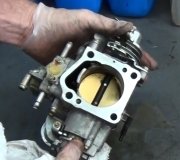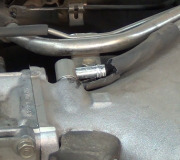Monday, November 21st, 2011 AT 1:12 AM
I have a 98 chrysler sebring convertible with a 2.5 v6 engine. For a few weeks now my car would drive but at highway speeds on an incline my engine would lack power and wouldnt go over 40 mph until I went back downhill. I checked under the hood and found that the egr valve was broken and the vacuum lines were broken. I replaced the valve and solenoid/transducer and checked the lines to make sure they were not clogged. Everything is working fine. Now for some reason I can not drive the car over 5mph down the street. I try revving it in my driveway in park and the car sounds like it is bogging and loses power. The car runs fine in idle but bogs if I rev it at all. I know it could be a number of different things but I just don't know where to start. I did the spark plugs and wires not to long ago. I used a scanner to see if there were any codes and got nothing.



